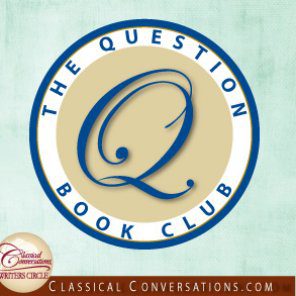Chapter Two – How Dialectic Teaches Family to Wrestle
I Heart Aristotle
by Cara McLauchlan
“Imagine the doors of a storehouse of knowledge being thrown open and a wealth of knowledge being available at your child’s ready disposal because you taught him how to ask the essential questions and that it was productive to ask them.”
— Leigh Bortins, The Question (pg. 34)
Have you ever wondered if you are more like Aristotle or Plato?
Okay, I admit it, I have. I recently came across a funny article that offered a quick quiz to discover if I was more like Aristotle or Plato. Purely unscientific, the article asked me how I eat pizza, what kind of car I drive, whether I like football, and if I own a dog, among other questions. (In case you are wondering: I eat pizza tip first, SUV, yes, and yes.)
While the survey was truly dorky, I loved learning more about the personalities of these amazing thinkers. It also caused me to consider that these greats might be more kindred spirits than lofty academicians in pillar-columned temples. Well, maybe they are that too, but I discovered I had more in common with them than I thought.
I can envision a really funny Tim Hawkins comedy act for homeschoolers that goes, “You might be an Aristotelian if you take a walk to learn calculus, or if you like to wrap yourself in a sheet to practice geography or do Latin declensions while singing an opera style song…” But, I digress.
In The Question, Leigh Bortins talks about how classical rhetoricians such as Socrates, Aristotle, and Cicero used a systematic approach to lead students through a subject. These tools are called the five common topics—definition, comparison, relationship, circumstance, and testimony. When I first read about these ideas, they did not feel “friendly” to me. In other words, they were nice to think about, but not to do. They were for Aristotle and his robe-sporting learners—how could an ordinary homeschool mom like me use them?
Then came what I call, “a situation.” Recently, my son and I were working through negative numbers in math. He simply did not get it. We started with the very basics by defining them. We defined them with songs, we compared them to positive numbers in games, we looked at relationships in videos, practiced them on paper. Still, he did not get it. We went back over it again. I could see the frustration mounting. We worked on it, then let it go, played some more, then rested. We pressed on. Day by day, I saw him start to understand—slowly at first, with only the adding and subtracting operations of negative numbers.
Then he got it. It became easier for him. His confidence soared. Sometimes it takes wrestling with something over a long period of time before it becomes easy. I did not know it at the time, but looking back over the steps we took, we were actually using Aristotle’s technique to learn about negative numbers. Yes, I’m Aristotle and I didn’t even know it.
Those five great tools that Leigh said were available to learn any subject, actually worked. The more I began to look at my own homeschooling day and how we tackle learning something new, the more I came to understand these tools are naturally intuitive. My guess is that you are already using them. See, you can be Aristotle, too.
What is amazing is how this framework guides a student through a deeper place of understanding. We can take any subject, any problem, any question and begin to know it with these tools. As my son moves closer to high school, I sometimes do not feel smart enough to support him on the path. But when I look at the resources with the five common topics, it makes the learning not so scary.
These tools allow us to break down any difficult subject into manageable parts. It may take time and patience to work through them, but what a gift to give our children—to know that they can learn anything. We do not have to be intimidated by hard subjects, we simply use our tools, break them down, and learn them one bit at a time.
The title of Chapter Two in The Question makes me smile: “How Dialectic Teaches Families to Wrestle.” Through our learning struggles, I have come to see how beautiful it is to wrestle. To see that learning is not always a “yes” or “no,” “get it and move on” type experience. It is through the daily toils, day after day, looking at something, seeing it from different places over time that we come to know a subject deeply. The struggle can be beautiful.
In learning something new, sometimes we do not always get it right. The wrestling teaches my son that even if he does not understand, that is excellent, too. In fact, it might even be better, because now we get to explore a subject in a fresh way when it is hard. It is good to wrestle. It is also good to be like Aristotle.
One Good Question:
Where does your family “wrestle” in homeschooling?
The Question Book Club Articles
Introduction – The Question Expedition
Chapter One – Dorothy, Doubts, and Dialectic
Chapter Two – I Heart Aristotle
Chapter Three – The Extraordinary FAQs
Chapters Four and Five – Three Big Ideas about the Three Rs
Chapters Six, Seven, and Eight – What’s Your Big Hairy Monster?
Chapters Nine, Ten, and Eleven – Who Is Your Hero?
Conclusion – The Best Question




